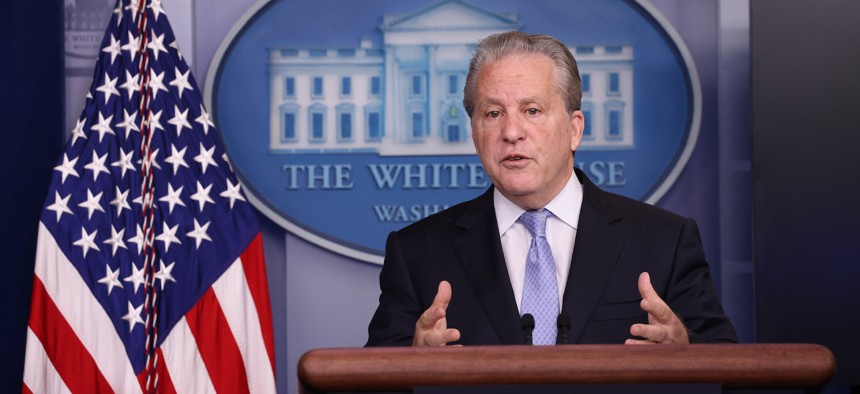White House, Senate Democrats tout new $1.4B anti-fraud proposal

White House advisor Gene Sperling briefs reporters from the press room in August 2021. Sperling is backing a plan to invest resources into antifraud measures to secure government benefits programs. Kevin Dietsch/Getty Images
Among the efforts that would see funding under the sweeping proposal are a new “early warning system” for fraud in government benefits.
A trio of Senate Democrats announced a broad legislative proposal on Tuesday meant to address pandemic-era fraud in government programs with about $1.4 billion.
The White House is touting the proposal — called the Fraud Prevention and Recovery Act — and says that if passed, it could prevent fraud in government programs moving forward and help investigate and prosecute fraudsters.
During the pandemic, many government benefits programs saw a rush of bad actors looking to cash in on the trillions in emergency funds, leading to fraud in programs like the COVID-19 economic injury disaster loan program and the paycheck protection program. Unemployment insurance alone saw an estimated $100 billion to $135 billion go to fraudsters masquerading as claimants to get government funds via identity theft.
“This act is going to strengthen existing accountability efforts to help get back stolen funds,” said one of its backers, Senate Homeland Security and Governmental Affairs Committee Chairman Gary Peters, D-Mich., in a call with reporters. “It’ll also hold bad actors accountable, and it’s going to ensure that taxpayer dollars are used responsibly.”
Senate Judiciary Committee Chair Dick Durbin, D-Ill., and Senate Finance Chair Ron Wyden, D-Ore. are also signed on to the bill.
It’s unclear if their colleagues will have the appetite to push the bill into law, but if it were to pass, it would provide funding and new or changed authorities to a range of government efforts, including several those to leverage the data the government already has to cross-check claims and prevent fraud.
The legislation authorizes $75 million for the Social Security Administration to build out a service to validate identity attributes like the name, date of birth and Social Security number of individuals asking for government benefits — something Wyden called “another step to reduce reliance on the sleazy private data brokers that don't protect Americans’ privacy.”
The Treasury Department’s Do Not Pay service, meant for agencies to cross-reference data to ensure that a government benefits claimant is eligible for federal funds, would also get $25 million, as well as authority to access new types of data.
The General Services Administration would also be tapped with $25 million to pilot an “early warning system” for government agencies to use to prevent identity fraud by notifying individuals if their identity information is cleared to access a public benefit program and allowing them to stop the transaction before it happens.
GSA’s Login.gov single sign-on system, which offers identity proofing, does not feature in the bill, although former administration officials have touted the importance of the platform as a government-backed digital identity solution.
Some of the efforts that are in the bill would be funded by a new “Identity Verification, Payment Integrity and Victims of Identity Fraud Fund” run by GSA and the Office of Management and Budget, which would also include $275 million for agencies to use to update their identity verification and fraud prevention systems.
“Tens of billions could have been saved if we simply had both the resources and databases and cooperation of the government ready to swiftly deploy the tools we already have,” said Gene Sperling, the White House’s American Rescue Plan Coordinator, who called the data matching elements of the bill “common sense.”
“A prior lack of investment in government administration and technology, the crush of demand and the removal of several, basic anti-fraud safeguards at the onset of the pandemic led the Biden administration to inherit historic levels of fraud,” he said.
The bill also targets ongoing enforcement efforts. The Justice Department’s COVID-19 fraud strike force teams would get $300 million for their efforts to prosecute fraudsters and recover stolen money, and the Small Business Administration and Labor Department watchdog offices would also see funding. The bill would also raise the cap for administrative recoveries of fraudulent claims from $150,000 to $1 million.
Since its inception in the Justice Department in mid-2021, the COVID-19 Fraud Enforcement Task Force has charged over 3,500 defendants with federal crimes and resulted in the seizure or forfeiture of over $1.4 billion in relief funds, according to a newly released report — although Attorney General Merrick Garland told reporters the work is “far from over.”
The proposal also includes funding meant to assist victims of identity theft, including $200 million to update identitytheft.gov as a one-stop shop for victims.
The White House says that the bill draws on the administration’s 2023 anti-fraud proposal, and also praised other, related anti-fraud bills already introduced by lawmakers.
The administration has also been working on an executive order meant to combat identity fraud in public benefits since 2022. It has yet to be released, although the White House recently told Nextgov/FCW in a statement that the order is still forthcoming.



